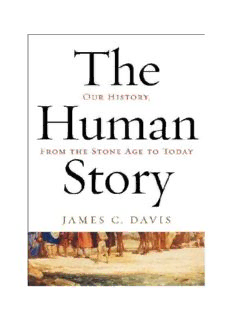
The Human Story: Our History, From the Stone Age to Today PDF
Preview The Human Story: Our History, From the Stone Age to Today
THE HUMAN STORY Our History, from the Stone Age to Today JAMES C. DAVIS To our children and theirs Contents Maps and Illustrations To the Reader 1. We fill the earth. 2. We gather by the rivers. 3. The wanderers settle down. 4. Two ancient cities follow diverse paths. 5. China excels and endures. 6. Some attempt to rule us all. 7. We found the worldwide faiths. 8. Europe prepares for its big role. 9. We find each other. 10. The New World falls to the Old one. 11. We suffer famine, war, and plague. 12. We discover who we are and where we live. 13. Here and there, the people rule. 14. We make more and live better. 15. The richer countries grab the poorer. 16. We multiply, and shrink the earth. 17. We wage a war to end war. 18. A utopia becomes a nightmare. 19. A Leader tries to shape a master race. 20. We wage a wider, crueler war. 21. The Asian giants try to feed their poor. 22. Some of us do well. 23. We walk along the brink. 24. We do the unbelievable. Epilogue: So Far So Good Recommended Reading Permissions Searchable Terms About the Author Other Books by James C. Davis Credits Copyright About the Publisher Maps and Illustrations MAPS Filling the Earth Two Early Civilizations The World of the Greeks China, the Middle Kingdom Empires of Antiquity Europe, as the Middle Ages Ended The Age of Discovery World War I Turning Points of World War II ILLUSTRATIONS How Writing Arose in Sumer King Narmer’s Victory Tablet The Older View of the Universe The Universe of Copernicus To the Reader This book tells how ancient wandering peoples settled down, and how they founded cities, conquered neighbors, formed religions, found out who they were and where among the stars they lived, did some good and many wrongs, thrived, and journeyed into space. I never told a soul that I was writing a book about the human past without his asking, “What’s your slant, your point of view?” If I have one it is this: In spite of all we hear and say, the world has been improving for a good long time. My hardest task was leaving out. Writing the human story is like packing a suitcase; you can’t find space for everything. I regret that this book seldom mentions the deeds of women. The human past was often like a play produced in Shakespeare’s time; men took all the roles. Inescapably the book has much to say in the final chapters about the United States, while it never mentions many of the nearly 200 nations in the world. Since so many nations have often behaved badly, not being mentioned here probably reflects well on them. I welcome your comments and suggestions. For their generosity and help, let me warmly thank these friends and fellow students of the past. Most of them are former colleagues at the University of Pennsylvania. Strange as it may seem, some of them wouldn’t know me if they saw me. But all of them were kind enough to lend a hand. My thanks to Wendy Ashmore, Tom Austin, James Baker, Richard Balkin, Richard Beeman, Tom Boyd, Lee Cassanelli, David Chaplin-Loebell, Thomas Childers, Frank Conaway, Hilary Conroy, five Davises (Daniel, David, Elda, Susan, and William, the last of whom greatly improved the whole manuscript), Richard Dunn, Ann Farnsworth-Alvear, Jeffrey Fear, Robert Forster, Louis Girifalco, Avery Goldstein, Ward Goodenough, Samuel Humes, Jeremy Jackson, Margaret Jacob, Christopher Jones, Robert Kraft, Bruce Kuklick, John and Miriam Lally, Lynn Lees, Walter Levy, and Paul Liebman. Also: Mia Macintosh, Victor Mair, Alan Mann, Joyce Martin, Walter McDougall, Cynthia Merman, Allyn Miner, Sue Naquin, Benjamin Nathans, Martin Ostwald, Robert Palmer, Ivo Panjek, Edward Peters, Sumathi Ramaswamy, Robert Regan, Frankie Rubinstein, Jerry Ruderman (who improved the entire manuscript), Madeline Sauvion, Selig and Jacqueline Savits, Barbara von Schlegell, Gino Segré, Benjamin Shen, David Silverman, Nathan Sivin, Ake Sjoberg, Bernard Steinberg, Nancy Steinhardt, Yvonne Surh, Emidio Sussi, Henry Teune, Jeffrey Tigay, Robert Turner, Étienne Van de Walle, Hugh Van Dusen, Susan Watkins, Martin and Dotty Wolfe, Charles Wright, Vikash Yadav, Sally Zigmond, and an expert copyeditor who chooses to remain anonymous. Chapter 1 We fill the earth. OUR TALE BEGINS when humans much like us evolved and filled the earth. Before that happened other humans had already come and gone. The most important of our forebears was Homo erectus, or Upright Men, so named because they stood on their two feet. They evolved in Africa about two million years ago and wandered into Asia. They sometimes lived in caves and sometimes in the open, and they chipped their simple tools from stone and learned the use of fire. Erectus had heavy brows and flatter skulls than we do, and if one were to enter a bus today the other riders probably would stealthily slip out. Before erectus vanished perhaps 300,000 years ago, they begat the species we belong to. We of course are Homo sapiens, or Wise Men. Immodestly we gave ourselves that name because we have larger brains, encased in higher skulls, than erectus. In spite of having larger brains, the early sapiens humans may not have had the gift of language. THEY CHANGE their minds every time they find an ancient skull, but anthropologists are fairly sure that our own subspecies evolved from sapiens about 160,000 years ago. We probably evolved in Africa, below the Sahara Desert. To indicate that we are a subspecies of sapiens, we call ourselves Homo sapiens sapiens, or Wise Wise Men. We are now the only variety of humans on earth.
Description: